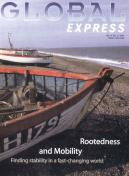 |
rootedness and mobility
rootedness and mobility
Enter the
airplane
— enabling us to travel anywhere, at any time, for any reason. And we think this is a good thing. Don’t we?
Enter the
cell phone
— enabling us to be reached anywhere, at any time, for any reason. And we think this is a good thing. Don’t we?
Enter
e-mail
— enabling us to send and receive messages anywhere, at any time, for any reason. And we think this is a good thing? Don’t we.
Don’t we?...
I’m from the United States. Recently I
was in Croatia to attend a conference—travel time, roughly nine hours to cover 4,505 miles. Within 15 minutes of landing, my colleague’s cell phone was in use, announcing my arrival to another colleague. Within one hour, I was on my colleague’s home computer sending an e-mail to my wife, letting her know that the plane had landed safely and that I was in good hands. Airplane. Cell phone. E-mail. All good things. Right?
Let me step you through a brief history of some related events:
•1860: US Pony Express carries mail from Missouri to California (approx. 2,000 miles). Travel time for a piece of mail:
10 days.
•1924: First airplanes fly around the world. Travel time: 175 days.
•1929: The Graf Zeppelin flies around the world. Travel time: 21 days.
•1933: First solo flight around the world. Travel time: 7 days.
•1948: First non-stop around the world flight. Travel time:
94 hours.
•1981: First Space Shuttle flight. Travel time around the earth:
90 minutes.
•1980s: Cell phones begin to take hold, particularly in Europe.
•1990s: E-mail really takes hold with development of Internet browser technology.
Apparently, the technology is now available to locate a person using a cell phone down to a range of a few meters, anywhere on the globe.
We are moving in the right direction. Right?
Does it matter where we live now? Does it matter where we work now? Does it matter where our family and friends live now? We are microseconds away from being in touch with anyone, anywhere, any time, for any reason. This is a good thing. Right?
What has the travel-communications-technology revolution brought us, really? Has it strengthened our relationships within families and between friends? Has it improved our sense of community? Has it prevented wars? The answer is undeniably no. The answer is also undeniably yes.
Poor inter-personal communication stands as one of the highest causes of divorce and workplace dissatisfaction. Communities, particularly within the US, are more fractured than ever—witness the recent race-related riots in Cincinnati, Ohio. Armed conflicts using some of the world’s most advanced technologies currently exist in more than 25 locations around the world.
On the other hand numerous arguments have been headed off—at least in my household—because of the judicious use of cell phones to communicate our whereabouts and timing. E-mail has enabled families and friends not just to stay connected but to deepen relationships when separated by long distances. Electronic communities, facilitated by ‘chat’ technology, enable relationships among people of varying backgrounds and nationalities who would otherwise not meet. Air travel has brought more people together and exposed them to more places than we could have imagined. And who knows? Perhaps a brief e-mail or text message to the right person at the right time did head off a war situation. I wouldn’t doubt it. Not now.
What has the travel-communications-technology revolution done to our sense of identity—our rootedness, so to speak? It was Socrates who told us that the unexamined life is not worth living, that to know one’s self is the primary goal of the thinking person. In this age of instant accessibility, who has time to ‘know thyself’? We have convinced ourselves of our own importance based on the number of phone calls and e-mail messages we receive in a day. We are so anxious to get from one place to another that we miss out on the here and now. We have lost our ability to be fully present with our families and friends, and to contribute to the communities in which we live. Dr Amitai Etzioni, university professor and leading spokesperson for the communitarian movement, has offered a definition of community—it includes both a web of affect-laden relationships and a commitment to a set of shared values, mores, meanings, and historical identity.1
There is no question in my mind that access to travel and improvements in communication technologies offer remarkable new means of creating communities. Sustaining communities, however, requires more than just technology. It requires me. And you. It requires clarity on what we, in our deepest sense, have to offer the community. Technology cannot answer this for us.
My suggestion? Turn your cell phone off. Turn your computer off. Turn your television off. Read a book. Think. Discover who you are. Then turn the technology back on and offer yourself more fully to your family, to your friends, to your community, and to the world.
1
The Monochrome Society
, Princeton University Press, 2001
Steven Greisdorf, USA
Steven is a financial planner and management consultant. He is currently serving on the Executive Committee of the Junior Round Table, an international network of young professionals bringing an ethical perspective to businesses around the globe. He lives with his wife and daughter in Maryland, USA.
|













